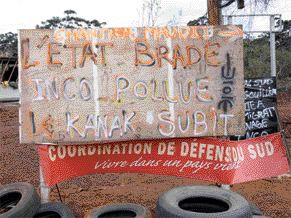Weeks after angry protesters at Inco’s (N-T, N-N) Goro site in New Caledonia caused upwards of $10 million in damages and forced a shutdown of operations, the nickel company is still tallying the bill and waiting for assurances from the local authorities that it’s safe to send employees back to work.
Inco says that during the first weekend in April a group of about 50 protesters caused extensive damage at the site of the massive nickel project, which is still under construction. Protesters damaged excavation equipment and set up road- blocks to the site. Several arrests were made following scuffles with local police who used teargas and armoured vehicles to break up the blockades. Several officers were injured in the melee. And according to local reports, police later apologized for using teargas on women and children.
Less than a week after the first attacks, the site saw more vandalism, including torched water pipes and damage to a communications tower.
The site has been shut down since early April, and the company says some protesters remain in the area.
Though things have quieted, the group responsible for the damage, the Rheebu Nuu Committee, has indicated that the conflict in the French overseas territory is far from over. The group, which represents some of the indigenous Kanak population of the southern province, says it will continue to protest against the project until permits for development — held by Inco subsidiary Goro Nickel — are cancelled, and a “genuine negotiation is organized.”
The project has long been the subject of protest by the Rheebu Nuu Committee. The committee wants further environmental study of the project, in particular, Goro Nickel’s plans to release wastewater into the sea, and the protection of local fresh water sources. Jacques Boengkih of Agence Kanak de Developpement Nouvelle-Caledonie, an indigenous organization that supports the committee, says the group also wants “a negotiated and legally binding settlement regarding social and environmental impacts, much as that signed with Inco by the Innu of Labrador.”
A roundtable meeting between the company, the French High Commissioner and the Rheebu Nuu Committee to resolve the standoff was sidelined recently when committee representatives walked out.
Boengkih says the representatives left the meeting because “the French High Commissioner, the Southern Province president and the Goro Nickel managers transformed the meeting into a tribunal to judge the Rheebu Nuu’s actions,” and into a forum of support for the project.
Opposition to the project is not universal in the South Pacific island, which hosts one-quarter of the world’s nickel laterite reserves. Many local politicians and even some Kanak chiefs support Goro.
Indefinite layoffs
Steve Mitchell, Inco’s director of public affairs, points to local media reports of protests by hundreds of Goro workers against the disruptions that have led to indefinite layoffs.
“There are about 1,600 people working on-site and 1,400 of them are New Caledonians,” he says. “There are hundreds of local businesses that are working on the project, so there’s a lot of people whose livelihoods are being directly impacted by this.”
Philippe Gomes, president of New Caledonia’s Southern Province, has criticized the Rheebu Nuu Committee’s actions publicly, claiming that environmental damage is not the group’s main concern.
“Environment is only the dressing,” he told a local television station. “The real bottom line is that they want to get royalties, and we are strongly opposed to the payment of any royalties. We believe the population must be an actor in the development process. This means to educate itself, to acquire skills, to work. To act otherwise is to choose to be a development pensioner, someone who sits under the coconut tree and waits for revenues to fall.”
Mitchell says that the group has not been left out of the company’s consultation with local communities. But because the group had boycotted many meetings, including those of an environmental surveillance committee set up by the government, it’s been “difficult to engage them in any kind of constructive dialogue,” he says.
After rising costs halted the project in 2002, Inco reconsidered and decided to develop Goro in 2004. Construction is well under way and the company anticipates a late 2007 startup.
Mitchell says the company won’t resume work until local authorities can guarantee the safety and security of the site.
Inco will release an update of the cost of the vandalism and construction delay when it releases its first-quarter results later this month.
The US$1.9-billion project, with a reserve of 95 million tonnes grading 1.53% nickel and 0.12% cobalt, is owned 69% by Inco, 21% by Japan’s Sumitomo Metal Mining and Mitsui and 10% by three New Caledonian provinces.


Be the first to comment on "Protesters paralyze Goro"